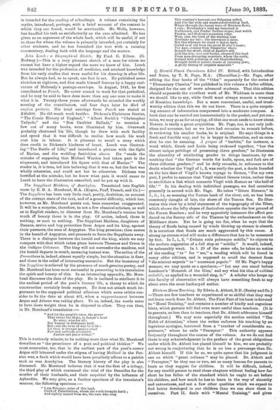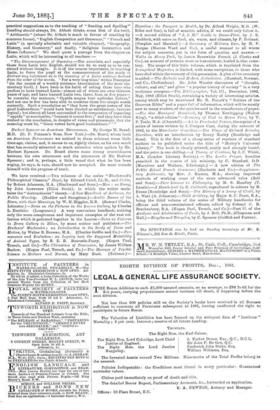Hints on Home Teaching. By Edwin A. Abbott, D.D. (Seeley
and Co.) —There are few teachers so experienced or so skilful that they may not learn much from Dr. Abbott. The First Part of his book is devoted to "Moral Training," and contains a number of kindly and sagacious hints, which parents will find even more useful than teachers. (It is' to parents, no less than to teachers, that Dr. Abbott addresses himself throughout.) We may note especially the section entitled "The' Habit of Attention," where the writer enforces his teaching by an ingenious apologue, borrowed from a "teacher of considerable ex- perience," whom he calls "Preceptor." This authority appears frequently throughout the course of the volume. As we do not find, there is any acknowledgment in the preface of the great obligations under which Dr. Abbott has placed himself to him, we are probably not wrong in conjecturing that he is no less a personage than Dr.. Abbott himself. If this be so, we quite agree that his judgment is one on which "great reliance" may be placed. Dr. Abbott and "Preceptor," be they one or two, set as many lessons for parents to. learn as they suggest for children. It will be difficult, indeed, for any candid person to read these chapters without feeling how far short he has fallen of the standard which he ought to set before his children, and how much he has to learn in the way of sincerity and earnestness, and not a few other qualities which we expect to find better developed in our children than we can show them in ourselves. Part II. deals with • "Mental Training," and gives
practical suggestions as to the teaching of "Reading and Spelling" (reading should always, Dr. Abbott thinks, come first of the two), "Arithmetic" (where Dr. Abbott is much in favour of teaching by -concrete forms), "English Composition and Grammar," "French and Latin" (a specially admirable and valuable chapter), "Geography, History, and Geometry," and finally, "Religious Instruction and Home Influence." We shall quote a passage from the chapter en Latin, which will be interesting to all teachers :—
"The Discouragement of Guessing.—The exercises, and especially those from Latin into English, should not be so easy as to be con- -strued without thought. It is of the utmost importance, in teaching Latin, to force the pupil at the commencement of the study to distrust any inferences as to the meaning of a Latin sentence derived from the order of the words. For a very long time,' writes Preceptor (in the course of a weekly entrance examination of the most ele- mentary kind), I have been in the habit of asking those boys who profess to have learned Latin—almost all of whom are over thirteen years of ago, and have learned Latin two, three, four, or five years— to construe the sentence, " Oppida magna boni agricolae habent," and not one in five has been able to construe these five simple words correctly. Such a translation as "they have the great towns of the good husbandman" would have been treated as satisfactory, because logical ; but almost all have succumbed to the temptation of regarding " oppida" as nominative, "because it comes first ;" and they. have thus
w ashed to the conclusion, in despite of cases and grammars, that the meaning must be, "Great towns have good hnsbandmen." ' "



































 Previous page
Previous page